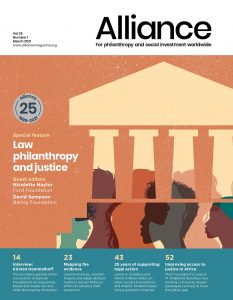In the shadow of the pandemic, injustices are deepening. Migrant workers are laid off from jobs yet unable to travel or access healthcare. Survivors of gender-based violence are cut off from the institutions that might ordinarily protect them. Entire communities are homebound, unable to stand up to unlawful corporate activities that threaten their lands and livelihoods.
This explosion of rights violations destabilises our societies and weakens our economies. If we are to rebuild from Covid-19, we must address the justice crisis. Fortunately, grassroots justice defenders in every country are drawing a roadmap toward recovery. Their work – empowering people to use the law to tackle injustice in its many forms – is an essential component of recovery. Any comprehensive Covid-19 response effort, whether public, private, or philanthropic, should include investment in grassroots legal empowerment.
Promoting legal empowerment entails more than an expansion of legal aid. It requires an integrated approach that considers where, in every sector, greater familiarity with the workings of law and government can help people to realise their rights. In a legal empowerment approach, lawyers are sometimes needed to reach a solution, but ordinary citizens are more often the principal agents of change.
We cannot expect grassroots groups to take on massive structural injustices without greater resources – especially in the long run, as we look to life after Covid-19.
In Kenya, for example, communities reported an increase in police brutality, extortion, and arrests relating to curfew enforcement. When interacting with law enforcement on the street, people must rely on their own knowledge to defend their rights. The Kariobangi Paralegal Network is using local radio to educate the public on what to do in these situations and offer guidance on specific laws to cite. In the Philippines, the organisation ELAC is helping communities to oppose large scale mining and agricultural projects that flout environmental regulations. During the pandemic alone, one company has destroyed more than 100 hectares of fragile forest without a permit. Because travel restrictions hamper the investigating ability of ELAC lawyers and government regulators, ELAC is training local leaders on the use of cell phones and GPS to document and report illegal deforestation.
Recognising that legal empowerment is critical to addressing the surging demand for justice, grassroots groups are spearheading efforts like these to help communities know, use, and shape the law. And they are doing so despite restricted mobility and limited resources.
The resourcefulness of justice defenders during the pandemic has its limits, however. We cannot expect grassroots groups to take on massive structural injustices without greater resources – especially in the long run, as we look to life after Covid-19.
That is why a group of global organisations dedicated to advancing justice launched the Covid-19 Grassroots Justice Fund last year. The Fund is distributing flexible, rapid-response grants to approximately 100 outstanding grassroots justice groups, who are finding creative and safe ways to adapt to the pandemic.

Read more about law, philanthropy & justice in our March issue
In December, the Fund announced the first 30 inspiring recipients, selected by grassroots justice leaders themselves. Familias Diversas Asociación Civil from Argentina, for example, is combatting the pandemic-related rise in the physical and sexual abuse of women, children, and members of the LGBTIQA+ community. Grassroots Development Support and Rural Enlightenment Initiative, from Nigeria, is ensuring that people with disabilities have access to lifesaving information and have a meaningful say in how the government responds to Covid.
By investing in grassroots efforts, the Covid-19 Grassroots Justice Fund aims to help prevent a shadow crisis of unmet justice needs, while supporting the grassroots justice leaders, innovations, and approaches vital to building back better.
To ensure a lasting and resilient recovery, a wide range of sustainable sources of financing for civil society legal empowerment efforts must be established. The Fund is an innovative frontline solution, but ultimately is only a small part of the broader picture. Every government and donor, from local to national, must explore how to integrate financial support for grassroots justice groups into stimulus packages or other long-term pandemic relief measures. By acknowledging and promoting the role of grassroots justice defenders in recovery efforts, we can help to rebuild a more equitable and prosperous world.
Abigail Moy is the Director of the Legal Empowerment Network, convened by Namati.






Comments (1)
Justice And Prosperity For All JP4A
GOOD EVENING AND THANKS FOR ALL ,YOU ARE GOOD PEOPLE
2021-2030-Decade of Healthy Ageing & Meeting the Needs of the Community! When something happens to derail a plan, like the pandemic, we must to be flexible and able to shift direction, to encourage social participation of persons of all ages. People and communities need to play a leading role in determining their development. Their first-hand knowledge equips them with the experience and expertise to create campaigns and policy solutions that really work. Community action demystifies the development process, introduces the actors involved, and provides community-led development strategies for development. One way to do that is by exercising empathy, we think about how empathy requires you to walk in someone else’s shoes to understand what they are facing, especially amid all this uncertainty. When we choose to open our minds and hearts to engage empathy, we acquire more tools for legal empowerment that transform our current models and succeed in unforeseen ways